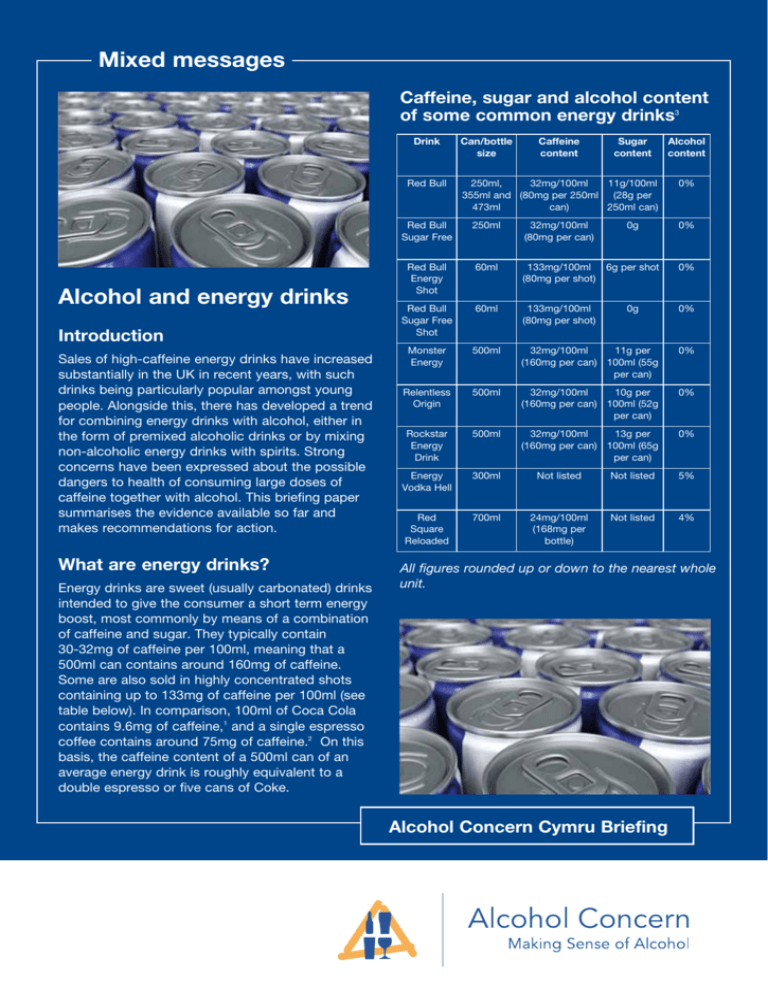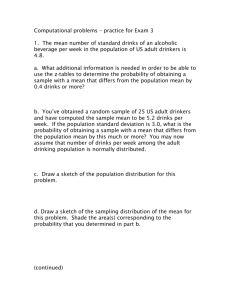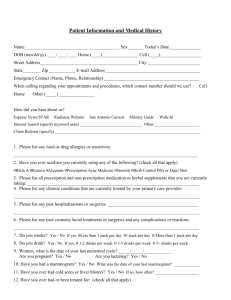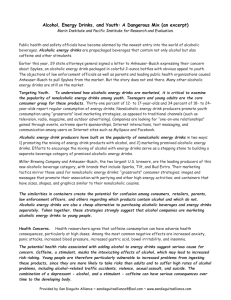
Mixed messages
Caffeine, sugar and alcohol content
of some common energy drinks3
Drink
Red Bull
Alcohol and energy drinks
Introduction
Sales of high-caffeine energy drinks have increased
substantially in the UK in recent years, with such
drinks being particularly popular amongst young
people. Alongside this, there has developed a trend
for combining energy drinks with alcohol, either in
the form of premixed alcoholic drinks or by mixing
non-alcoholic energy drinks with spirits. Strong
concerns have been expressed about the possible
dangers to health of consuming large doses of
caffeine together with alcohol. This briefing paper
summarises the evidence available so far and
makes recommendations for action.
What are energy drinks?
Energy drinks are sweet (usually carbonated) drinks
intended to give the consumer a short term energy
boost, most commonly by means of a combination
of caffeine and sugar. They typically contain
30-32mg of caffeine per 100ml, meaning that a
500ml can contains around 160mg of caffeine.
Some are also sold in highly concentrated shots
containing up to 133mg of caffeine per 100ml (see
table below). In comparison, 100ml of Coca Cola
contains 9.6mg of caffeine,1 and a single espresso
coffee contains around 75mg of caffeine.2 On this
basis, the caffeine content of a 500ml can of an
average energy drink is roughly equivalent to a
double espresso or five cans of Coke.
Can/bottle
size
Caffeine
content
Sugar
content
Alcohol
content
250ml,
32mg/100ml
11g/100ml
355ml and (80mg per 250ml (28g per
473ml
can)
250ml can)
0%
Red Bull
Sugar Free
250ml
32mg/100ml
(80mg per can)
0g
0%
Red Bull
Energy
Shot
60ml
133mg/100ml
(80mg per shot)
6g per shot
0%
Red Bull
Sugar Free
Shot
60ml
133mg/100ml
(80mg per shot)
0g
0%
Monster
Energy
500ml
32mg/100ml
11g per
(160mg per can) 100ml (55g
per can)
0%
Relentless
Origin
500ml
32mg/100ml
10g per
(160mg per can) 100ml (52g
per can)
0%
Rockstar
Energy
Drink
500ml
32mg/100ml
13g per
(160mg per can) 100ml (65g
per can)
0%
Energy
Vodka Hell
300ml
Not listed
Not listed
5%
Red
Square
Reloaded
700ml
24mg/100ml
(168mg per
bottle)
Not listed
4%
All figures rounded up or down to the nearest whole
unit.
Alcohol Concern Cymru Briefing
Mixed messages
Alcohol Concern Cymru Briefing
Arguments about the alleged
benefits of energy drinks
Energy drinks are often marketed on the
basis of health enhancing properties. The
manufactures of Red Bull state that their
drink “increases concentration and reaction
speed” and “improves your overall wellbeing”.4 Relentless is said to “give you the
stamina, focus and drive you need, when you
need it”.5 Conversely, researchers at Miami
University concluded earlier this year that
“energy drinks have no therapeutic benefit,
and many ingredients are understudied and
not regulated”.6 Similarly, whilst energy drinks
are specifically promoted to athletes, the
body regulating high school sports in the USA
referred in 2008 to the “the absence of benefit
and the presence of potential risk associated
with energy drinks”.7
Sales of energy drinks
Since Red Bull first appeared on the European
market in 1987, sales of energy drinks have
increased rapidly. In 2009, independent analysts
Mintel found that sales of sports and energy
drinks in the UK were set to rise to £1 billion
during that year, with Britons consuming an
estimated 525 million litres of these drinks.
Mintel also predicted that sales of sports and
energy drinks would increase further to £1.5
billion (or 757 million litres) by 2014.8 During
2010, 4.2 billion cans of Red Bull were sold
worldwide, in 161 countries. Within these
global sales, the USA and Western Europe are
regarded as core markets for energy drinks.9
Marketing to young people
Sales of energy drinks are particularly high
amongst young people,10 and their branding,
packaging and marketing very much reflects
2
this demographic. Cans of the various
Relentless brands use imagery redolent of
fighting-fantasy games and heavy metal
music,11 whilst Rockstar Energy Drinks promote
a number of alternative sports and rap and rock
performers.12 Similarly, Red Square Reloaded
– a widely available alcoholic energy drink –
uses images of a gritty urban landscape and
graffiti-style graphics on its bottles, drawing
on the iconography of the urban rap scene.13
Producers Halewood International clearly
state that Red Square Reloaded is specifically
aimed at the youngest end of the legal drinking
market.14
The strong appeal of energy drinks to young
people and the targeting of young consumers
by the producers of such drinks raise number of
questions:
• Do non-alcoholic energy drinks provide too
easy a stepping stone for young people to
the use (and misuse) of alcohol, especially if
they are aware that their favourite caffeinated
soft drink is also widely used as a mixer for
alcohol?
• Will young consumers who are familiar with
a particular non-alcoholic energy drink move
more easily to its alcoholic equivalent, e.g.
from Red Alert to Red Square Reloaded?
Concerns of this nature led in 2007 to the
withdrawal from the American market of
Rockstar 21, an alcoholic energy drink felt to
be too similar in taste and appearance to the
Rockstar company’s non-alcoholic energy
drinks.15
• Given that alcoholic energy drinks are often
sweet in taste, will they appeal more to
younger drinkers who are not attracted by
more traditional beers and wines?
Mixed messages
Alcohol Concern Cymru Briefing
Mixing energy drinks with alcohol
The small number of premixed alcoholic energy
drinks on sale in the UK typically contain
4- 5% alcohol.16 Alongside this is the common
practice of mixing non-alcoholic caffeine drinks
with alcohol, with the resultant alcohol content
being potentially much higher. Popular versions
of this include the JägerBomb, in which a shot
of Jägermeister liqueur (35% alcohol) is dropped
into a glass of Red Bull. The Flares chain of bars
offers JägerBombs and JägerBulls, as well as
TVR – a “supercharged mix” of tequila, vodka
and Red Bull17 – whilst Revolution bars sell
pitchers of Absolut Chambulls, containing Red
Bull and sparkling pear wine along with “at least
6 shots” of vodka.18
The Red Bull company use imagery of their
product being mixed with vodka on their
website, suggesting that the company is entirely
comfortable with the widespread use of its
product as a mixer for alcohol.19 Similarly, the
Jägermeister distillery publish recipes for mixing
their product with energy drinks, including
the Flying Deer made from Jägermeister,
vodka, white wine and Red Bull.20 Halewood
International describe their non-alcoholic Red
Alert energy drink as “the perfect mixer for Red
Square Vodka”, stating that “Red Alert remains
a key drive line within the Red Square stable”.21
Concerns about energy drinks
and alcohol
An increasing body of evidence exists on
the possible dangers of mixing energy drinks
with alcohol. Whilst alcohol is a depressant,
caffeine is a stimulant, and a number of studies
have shown that consuming energy drinks
with alcohol may make drinkers feel more
alert, although this does not make them any
less drunk. One possible result of this is that
drinkers will take more risks, since they are
less aware of how drunk they actually are.22 23
The caffeine in energy drinks may also mean
that drinkers stay awake longer, and so drink
more. In effect, high-caffeine drinks may remove
the natural brake that the sedative effect of
alcohol can put on an evening’s drinking.
“Having maximum fun at a long lasting
club session or a house party requires
robust physical endurance. That’s why a
whole generation swears by the boost of
Red Bull to fly through the night.”
Red Bull website, 201124
These dangers have been highlighted in two
recent studies from the USA:
• A University of Florida survey of students
in 2009 found that those who had drunk
alcohol mixed with energy drinks were three
times more likely to leave a bar very drunk,
and four times more likely to intend to drive,
compared with drinkers who had ordinary
alcoholic drinks.25
• A similar survey of students in North Carolina
in 2006 found that those who mixed alcohol
and energy drinks were more likely to have
an injury, ride with a drunk driver, or have an
unwanted sexual experience.26
In addition, both caffeine and alcohol are
diuretic – they cause the body to pass more
urine and so lead to dehydration – and this may
be further worsened by the high sugar content
of many energy drinks. In the short-term,
dehydration can cause nausea, headaches and
vomiting. Longer-term, it can lead to problems
with organs and joints, as well as sunken eyes
and premature ageing of the skin.27
3
Mixed messages
Alcohol Concern Cymru Briefing
Recommendations
In the meantime:
The issue of alcohol and energy drinks is far
from simple, and responses to it in various
countries highlight this complexity. Alcoholic
drinks made with synthetic caffeine are
banned in Canada, although this has left
some well-known alcoholic energy drinks on
sale.28 In 2010, the American Food and Drugs
Administration ordered four companies to
withdraw specific drinks from sale, stating
that caffeine added to alcoholic drinks was an
“unsafe food additive”.29 Both countries have,
however, stopped short of a comprehensive
ban on alcoholic energy drinks. Within the
UK, the Scottish Labour Party proposed in
2010 setting a maximum limit of 15mg/100ml
for caffeine in alcoholic drinks (compared
with 24mg/100ml in Red Square Reloaded)30
although this was rejected by the Scottish
Parliament.31
• Alcohol information and awareness raising
campaigns need to ensure that consumers
are fully aware of the potential dangers of
consuming alcohol with large amounts of
caffeine.
The issue of mixing alcohol with non-alcoholic
energy drinks is, perhaps, even more complex
since the separate ingredients can by easy
bought and mixed by consumers, even if they
are not sold or promoted together. Within this
context, Alcohol Concern makes the following
recommendations for action:
• A comprehensive review is needed of
the existing evidence on the effects of
consuming alcohol mixed with highly
caffeinated drinks. New research should
be commissioned to address any gaps in
current knowledge, with a view to developing
clearer guidance and regulations on the sale
and marketing of such drinks. Specifically,
research is needed into patterns and trends
of consumption of alcohol and energy drinks
in the UK, and into whether the consumption
of such drinks is linked to increased harm to
health and to more risk taking behaviours in
this country.
4
• Producers of alcoholic and non-alcoholic
energy drinks should actively promote
messages about the possible risks of mixing
caffeine and alcohol in their marketing
campaigns and on-line presence.
• Pubs, clubs and bars should avoid the
promotion of high-caffeine energy drinks as
a mixer for alcohol.
References
1.
Coca Cola website (2011) http://www.
coca-cola.co.uk/faq/ingredients/howmuch-caffeine-is-in-diet-coke-coca-colaand-coke-zero.html [accessed 16/05/2011].
2.
Starbucks website (2011) http://assets.
starbucks.co.uk/assets/beveragenutritional-spring-2011.pdf [accessed
16/05/2011].
3.
Information from product packaging,
purchased April 2011.
4.
Red Bull website (2011) http://www.
redbull.com/cs/Satellite/en_INT/red-bullenergy-drink/001242937921959 [accessed
16/05/2011].
5.
Relentless website (2011) http://www.
relentlessenergy.com/products/origin.html
[accessed 16/05/2011].
6.
Seifert, S.M. et al (2011) Health effects of
energy drinks on children, adolescents,
and young adults, Pediatrics, Volume 127,
Number 3, online, available from: http://
pediatrics.aappublications.org/cgi/content/
abstract/peds.2009-3592 [accessed
16/05/2011].
Mixed messages
Alcohol Concern Cymru Briefing
7.
National Federation of State High School
Associations (2008) Position statement and
recommendations for the use of energy
drinks by young athletes, Indianapolis,
NFHS, online, available from: http://www.
nfhs.org/ [accessed 16/05/2011].
8.
Mintel press release (2009) Is there any
limit to the growth potential of sports and
energy drinks?, online, available from:
http://oxygen.mintel.com/sinatra/reports/
display/id=394414 [accessed 16/05/2011].
9.
Red Bull website (2011) http://www.
redbull.com/cs/Satellite/en_INT/companyfigures/001242939605518?pcs_c=PCS_
Product&pcs_cid=1242937556133
[accessed 16/05/2011]
10. Mintel press release (2010) Sports and
energy drinks – Europe – December 2010,
online, available from: http://oxygen.mintel.
com/sinatra/reports/display/id=490790
[accessed 17/05/2011].
11. Relentless website (2011) http://www.
relentlessenergy.com/products/inferno.
html [accessed 16/05/2011].
12. Rockstar website (2011) http://www.
rockstarenergy.co.uk/ [accessed 16/05/2011].
13. Information from product packaging,
purchased April 2011.
14. Halewood International website (2011)
http://www.halewood-int.com/home/
brands/red-square-reloaded-ice [accessed
17/05/2011].
15. Marin Institute (2007) Alcohol, energy
drinks and youth: a dangerous mix, San
Rafael, Marin Institute, online, available
from: http://www.marininstitute.org/
alcopops/energy_drink_report.htm
[accessed 17/05/2011].
16. Information from product packaging
of Energy Vodka Hell and Red Square
Reloaded, purchased April 2011.
17. Flares website (2011) http://www.
flaresbars.co.uk/flarescardiff/pdf/
flarescardiff-drinks_menu.pdf [accessed
16/05/2011].
18. Cocktails menu in Revolution, Cardiff,
reviewed April 2011.
19. Red Bull website (2011) http://www.
redbull.co.uk/cs/Satellite/en_UK/Gallery/
Notting-Hill-Carnival-2010/VodkaRed-Bull-021242898202365?GImage
Id=1242898690820#/image-9 [accessed
16/05/2011].
20. Jägermeister website (2011) http://www.
jagermeister.com/cmsfiles/20260520_1_
JM_Drinks_Recipes_Download_150.pdf
[accessed 16/05/2011].
21. Halewood International website (2011)
http://www.halewood-int.com/home/
brands/red-alert [accessed 17/05/2011].
22. Marczinski, C.A, et al (2011) Effects
of energy drinks mixed with alcohol
on behavioral control: risks for college
students consuming trendy cocktails,
Alcoholism: Clinical and Experimental
Research, first published online, available
from: http://onlinelibrary.wiley.com/
doi/10.1111/j.1530-0277.2011.01464.x/
abstract [accessed 16/05/2011].
23. Ferreira, S.E. et al (2006) Effects of energy
drink ingestion on alcohol intoxication,
Alcoholism: Clinical and Experimental
Research Volume 30, Number 4. http://
www.ncbi.nlm.nih.gov/pubmed/1657
3577?itool=EntrezSystem2.PEntrez.
Pubmed.Pubmed_ResultsPanel.Pubmed_
RVDocSum&ordinalpos=2 [accessed
17/05/2011].
24. Red Bull website (2011) http://www.
redbull.com/cs/Satellite/en_INT/red-bullenergy-drink/001242937921959?pcs_
pvt=whenandwhere2drink [accessed
16/05/2011].
5
Mixed messages
25. Thombs, D.L. et al (2009) Event-level
analyses of energy drink consumption
and alcohol intoxication in bar patrons,
Addictive Behaviors, Volume, 35 Issue
4, online, available from: http://www.
marininstitute.org/site/images/stories/
pdfs/energydrinks_and_intoxication.pdf
[accessed 16/05/2011].
26. O’Brien, M.C. et al (2007) Caffeinated
cocktails: get wired, get drunk, get
injured, School of Medicine, Wake Forest
University, online, available from: http://
www.cspinet.org/new/pdf/obrien.pdf
[accessed 16/05/2011].
27. NHS Choices website (2011) http://www.
nhs.uk/Conditions/Dehydration/Pages/
Symptoms.aspx [accessed 16/05/2011].
28. Schmidt, S. (2010) Health Canada strikes
an uneasy regulatory balance on alcoholic
energy drinks, online, available from:
http://www.canada.com/health/Health+Ca
nada+strikes+uneasy+regulatory+balance
+alcoholic+energy+drinks/3039397/story.
html [accessed 16/05/2011].
29. US Food and Drug Administration (2010)
Questions and answers: caffeinated
alcoholic beverages, online, available
from: http://www.fda.gov/Food/
FoodIngredientsPackaging/ucm233726.
htm [accessed 17/05/2011].
30. Rose, G. (2010) Labour: ban high-caffeine
alcohol, The Sunday Times, 7 February
2010, online, available from: http://
www.timesonline.co.uk/tol/news/uk/
scotland/article7017981.ece [accessed
17/05/2011].
31. Johnson, S. (2010) MSPs reject alcohol
minimum pricing, The Daily Telegraph,
10 November 2010, online, available
from: http://www.telegraph.co.uk/news/
uknews/scotland/8124301/MSPs-rejectalcohol-minimum-pricing.html [accessed
16/05/2011].
About Alcohol Concern
Alcohol Concern is the national agency on alcohol misuse campaigning for effective alcohol
policy and improved services for people whose lives are affected by alcohol-related problems.
We are a membership body working at a national level to influence alcohol policy and champion
best practice locally. We support professionals and organisations by providing expertise,
information and guidance. We are a challenging voice to the drinks industry and promote public
awareness of alcohol issues.
Alcohol Concern Cymru Briefing
Published by Alcohol Concern,
on behalf of Alcohol Concern Cymru,
Alcohol Concern Cymru, 8 Museum Place, Cardiff, CF10 3BG
Tel: 029 2022 6746
All rights reserved. No part of this publication may be
produced, stored in a retrieval system, or transmitted by
any means without the permission of the publishers and the
copyright holders.
Email: acwales@alcoholconcern.org.uk
Image provided by iStockphoto.
Website: www.alcoholconcern.org.uk
Alcohol Concern is a registered charity no. 291705 and a
company limited by guarantee registered in London no.
1908221.
Copyright: Alcohol Concern June 2011



